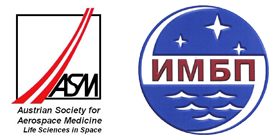From the Project AUSTROMIR-91 to the Project RUSSIAN LONGTERM FLIGHT (RLF)
A long-term flight of a Russian cosmonaut was scheduled for the MIR space station from the end of 1993 to the beginning of 1995 within the framework of the national Russian space programme. The extraction of basic knowledge regarding long-term effects of weightlessness during a sojourn in space would be possible through the first-time sojourn of a human in space for a minimum of 14 months without break.
On the basis of long-lasting successful collaboration in the area of space medicine between the Austrian scientific institutes and the Institute for Biomedical Problems (IMBP) in Moscow, within the framework of AUSTROMIR-91 and its following phases AUSTROMIR-E and MED-F, the Austrian scientists for medical experiments were invited to participate in this unique long-term flight.
An agreement was therefore signed at the beginning of March 1993 between the IMBP and the Austrian Society for Aerospace Medicine (ASM) on behalf of the Ministry for Science and Research (BMWF) for the continuation of a total of 10 Austrian experiments. Basically, the equipment onboard the MIR space station that was developed within the framework of AUSTROMIR-91; to start with and conduct further development of these equipments during the project lifetime in technical and medical/scientific aspects.
Commitments of the Austrian side
Within the framework of this cooperation, the ASM overtook the position as a responsible representative of the Austrian side with the following commitments:
- The functionality of the equipment located onboard the space station and on the ground, adhere to the requirements for the training of the cosmonauts and for the execution of the common scientific programme;
- The execution of the required work for the further development of the methods and equipment for the continuation of the agreed experiments;
- To manage the conditions of the common cooperation of the Russian and Austrian specialists.
Commitments of the Russian side
Within the framework of this cooperation, the IMBP was the responsible representative of the Russian side, primarily for the organization and execution of all activities that were required for the planning and execution of the project, especially even the transport of consumables and the required devices to the MIR space station.
The commitment of the Russian partners in the medical / scientific area includes, amongst others, the following items:
- Medical supervision during all phases of the preparation and execution of the experiment;
- Execution of the cosmonauts? training and the assessment of the training quality;
- Execution and participation of experiments before and after the flight;
- Methodical monitoring during the execution of the experiments onboard the MIR space station;
- Assessment of the experiments conducted (incl. results and suggestions);
- Cooperation in the analysis of the data that was won before, during and after the flight;
- Consultation of the Austrian experts during the execution of the common experiments;
- Participation in the planning of technical improvements for the equipment available;
- Provision of an adequate amount of cosmonaut hours for the execution of the common medical experiments;
- Warranty of the delivery of complete technical-scientific information for the common experiments that were conducted before, during and after the flight.
